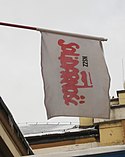Portal:Poland/Selected article/1
The history of Solidarity, a Polish non-governmental trade union, began in August 1980 at the Lenin Shipyard in Gdańsk where it was started by Lech Wałęsa and his co-workers. In the early 1980s, it became the first independent labor union in a Soviet-bloc country. Solidarity gave rise to a broad anti-communist nonviolent social movement that, at its height, united some 10 million members and vastly contributed to the fall of communism. Poland's communist government attempted to destroy it by imposing martial law in 1981, followed by several years of political repression, but it was ultimately forced to begin negotiating with the union. Round Table Talks between the weakened government and the Solidarity-led opposition resulted in a semi-free parliamentary election in 1989. By the end of August 1989, a Solidarity-led coalition government had been formed and, in December 1990, Wałęsa was elected president. This was soon followed by the dismantling of the communist governmental system and by Poland's transformation into a modern democratic state. Solidarity's example led to the spread of anti-communist ideas and movements throughout the countries of the Eastern Bloc, weakening their communist governments; a process known as the Revolutions of 1989, or the Autumn of Nations. (Full article...)

